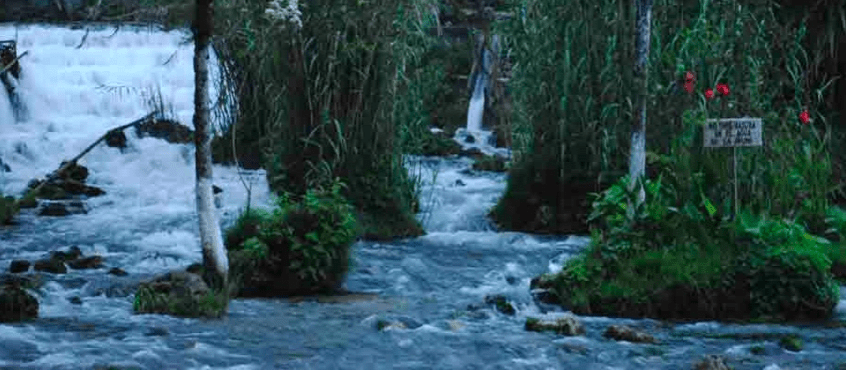Public protest against water privatisation increased dramatically in El Salvador from 2006, when former President Tony Saca’s ARENA party proposed a new General Water Law. The law, not yet passed, would decentralise water administration from the national to municipal levels where local governments would have to contract private firms to manage water for up to 50 years. Civil society groups in the country continue to argue that this is tantamount to privatisation.
In September 2006, residents of Santa Eduviges – a small community of 300 near the San Salvador suburb of Soyapango – blocked the Gold Highway that leads into the capital. Protesters were demanding the de-privatisation of the town’s water supply system with its management to be taken over by the national water agency, ANDA.[1] They occupied the road from morning until evening when police fired tear gas to dislodge the crowd and arrested five people.[2] They were later released.
Then in March 2007, on World Water Day, approximately 5,000 people took to the streets of San Salvador to protest against the high cost of water and its unjust distribution.
On July 2, 2007 another anti-privatisation demonstration took place in the town of Suchitoto. El Salvadoran police used rubber bullets and tear gas and arrested 14 protestors. Thirteen were charged with acts of terrorism and became known as the ‘Suchitoto 13’. Jason Wallach, writing on the Upside Down World website, said that after six months of deliberation, all charges were eventually dropped. On 2 May, 2008, however, the youngest protestor – 19 year old Hector Antonio Ventura – was murdered by unknown assailants in a house in Valle Verde, Suchitoto.[3]
His death is thought to have been politically motivated considering that just days earlier, he had agreed to speak at the Day Against Impunity to be held on July 2, the first anniversary of the arrest of the Suchitoto 13.[4]
Human rights groups including Amnesty International accused the government of unjustly using anti-terrorism legislation in order to quell future public protest.[5]
[1] Jason Wallach (27 September 2006) ‘El Salvador’s Water: Not for Sale’, Upside Down World, http://upsidedownworld.org/main/content/view/1276/68/ (Accessed 21/07/09)
[2] North American Congress on Latin America (NACLA) website https://nacla.org/node/1499 (Accessed 21/07/09)
[3] Op.cit. (Jason Wallach)
[4] UNHCR website, http://www.unhcr.org/refworld/docid/4a6452bc8.html (Accessed 21/07/09)
[5] Amnesty International website, http://www.amnesty.org/en/library/asset/AMR29/002/2007/en/a09ac5c1-5055-47ff-b2fa-7ba042d9e6ab/amr290022007en.html (Accessed 21/07/09)

 On Tuesday, September 10, representatives of the diverse social movement organizations of the Water Forum held a press conference at the National Legislative Assembly to denounce proposed reforms to the controversial Public-Private Partnership (P3) Law as a back door, right-wing effort to privatize water. The reforms seek to include water treatment and administration among the public goods open for private contracts and concession after the leftist Farabundo Martí National Liberation Front (FMLN) party successfully excluded water from the original legislation.
On Tuesday, September 10, representatives of the diverse social movement organizations of the Water Forum held a press conference at the National Legislative Assembly to denounce proposed reforms to the controversial Public-Private Partnership (P3) Law as a back door, right-wing effort to privatize water. The reforms seek to include water treatment and administration among the public goods open for private contracts and concession after the leftist Farabundo Martí National Liberation Front (FMLN) party successfully excluded water from the original legislation. With the ink barely dry on the State Department’s commitments to work with the incoming administration of Salvador Sánchez Cerén of the leftist Farabundo Martí Liberation Front (FMLN), US Ambassador Mari Carmen Aponte continues her crusade for privatization policy, intervening in El Salvador’s legislative affairs to promote corporate interests. Aponte has taken up lobbying efforts to urge the Legislative Assembly to approve reforms to the US-backed Public-Private Partnership (P3) Law, conditioning US development aid on the passage of the reforms package. The Ambassador insists the reforms are necessary to invest the pending $277 million Millennium Challenge Corporation (MCC) funds, claiming El Salvador’s investment conditions “are not totally mature yet.”
With the ink barely dry on the State Department’s commitments to work with the incoming administration of Salvador Sánchez Cerén of the leftist Farabundo Martí Liberation Front (FMLN), US Ambassador Mari Carmen Aponte continues her crusade for privatization policy, intervening in El Salvador’s legislative affairs to promote corporate interests. Aponte has taken up lobbying efforts to urge the Legislative Assembly to approve reforms to the US-backed Public-Private Partnership (P3) Law, conditioning US development aid on the passage of the reforms package. The Ambassador insists the reforms are necessary to invest the pending $277 million Millennium Challenge Corporation (MCC) funds, claiming El Salvador’s investment conditions “are not totally mature yet.”